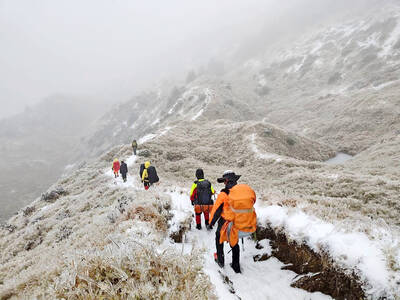Harsh criticism of and strong opposition to Taiwan's planned UN referendum by US officials recently could stir up even more anti-US sentiment in Taiwan, academics said in a seminar yesterday.
"Recent public opinion polls show that US popularity in Taiwan has been decreasing as the latter has been leaning toward China in handling the Taiwan Strait issue," said Lo Chih-cheng (羅致政), a professor of politics at Soochow University, during a seminar organized by the pro-independence Taiwan Thinktank.
"The Americans should pay close attention to this," Lo said, because anti-US sentiment was almost non-existent during the past decades in Taiwan. If the sentiment develops into anti-Americanism, we will probably see a fundamental and structural change in Taiwan-US relations in future, he said.
Tung Li-wen (董立文), deputy executive at the Taiwan Foundation for Democracy, agreed that the intensity of anti-US sentiment is unprecedented, saying it resulted from the US "actually helping China change the status quo and pressuring Taiwan to kowtow to China."
"The worst-case scenario would be that Taiwan becomes not only an anti-communist country but also anti-US at the same time," Tung said.
Most Taiwanese have the impression that the US has been putting much more pressure on Taiwan than on China by failing to ask it to remove its missiles, improve human rights and stop squeezing Taiwan's international space, Lo said.
People have the impression that Taiwan's democracy, which the US had called for since the end of World War II, was not enough to give it the recognition it deserves internationally, said Chen Wen-hsien (陳文賢), a professor at National Chengchi University.

Trips for more than 100,000 international and domestic air travelers could be disrupted as China launches a military exercise around Taiwan today, Taiwan’s Civil Aviation Administration (CAA) said yesterday. The exercise could affect nearly 900 flights scheduled to enter the Taipei Flight Information Region (FIR) during the exercise window, it added. A notice issued by the Chinese Civil Aviation Administration showed there would be seven temporary zones around the Taiwan Strait which would be used for live-fire exercises, lasting from 8am to 6pm today. All aircraft are prohibited from entering during exercise, it says. Taipei FIR has 14 international air routes and

The Ministry of National Defense (MND) today released images of the military tracking China’s People's Liberation Army (PLA) movements during the latest round of Chinese drills around Taiwan. The PLA began "Justice Mission 2025" drills today, carrying out live-fire drills, simulated strikes on land and maritime targets, and exercises to blockade the nation's main ports. The exercises are to continue tomorrow, with the PLA announcing sea and air space restrictions for five zones around Taiwan for 10 hours starting from 8:30am. The ministry today released images showing a Chinese J-16 fighter jet tracked by a F-16V Block 20 jet and the

Snow fell on Yushan (Jade Mountain, 玉山) yesterday morning as a continental cold air mass sent temperatures below freezing on Taiwan’s tallest peak, the Central Weather Administration (CWA) said. Snowflakes were seen on Yushan’s north peak from 6:28am to 6:38am, but they did not fully cover the ground and no accumulation was recorded, the CWA said. As of 7:42am, the lowest temperature recorded across Taiwan was minus-5.5°C at Yushan’s Fengkou observatory and minus-4.7°C at the Yushan observatory, CWA data showed. On Hehuanshan (合歡山) in Nantou County, a low of 1.3°C was recorded at 6:39pm, when ice pellets fell at Songsyue Lodge (松雪樓), a

NO SHAME IN RETREAT: Hikers should consider turning back if the weather turns bad or if they do not have sufficient equipment, the Taroko park headquarters said Two people died of hypothermia over the weekend while hiking on Hsuehshan (雪山), prompting park authorities to remind hikers to bring proper equipment and consider their physical condition before setting out in the cold weather. Temperatures dropped over the weekend, bringing snow to high altitudes in Shei-pa National Park. One hiker, surnamed Lin (林), who on Friday was traveling with a group of six along the Hsuehshan west ridge trail, lost consciousness due to hypothermia and died, the Shei-pa National Park Headquarters said. On Saturday, another hiker, surnamed Tien (田), in a group of five on the southeast of the west